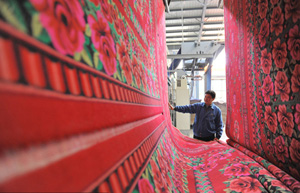'Made in France' plan no cure-all
By Li Xiang ( China Daily ) Updated: 2013-11-18 07:02:18Everyone in France seems unhappy these days, with almost every reform proposed by the French socialist government greeted with protests.
First, French soccer clubs threatened to strike over the 75 percent tax on the rich. Then the farmers in Brittany rebelled against the eco-tax on heavy vehicles. Next came angry teachers, who protested against the extension of the school timetable.
But there is one movement that has not evoked much public antipathy: the "Made in France" campaign, the brainchild of Arnaud Montebourg, the French minister of industrial renewal. He is calling on people to buy French-made products, ranging from food and textiles to home appliances, in hopes of reindustrializing the country and safeguarding employment at home.
Who could protest against such economic patriotism? In fact, buying French has become the trendy thing to do in France, with polls showing that 73 percent of French people are willing to buy French products, even if it means they have to pay more.
But if you go to a grocery or department store in Paris, insisting on buying only products made entirely in France, you will end up with a very limited choice. It seems that there is always some ingredient or component that originates in a foreign country or is made by a foreign-owned company.

And this brings up an important question: How should people define the concept of "Made in France"?
Is there anything that is still 100 percent made in France, or in China, or anywhere in the world?
Take French wine, for example. If the owner of the chateau is Russian or Chinese, does the wine still count as a French product? I assume most people would answer yes, because it is indeed produced in France, by French workers, under certain quality standards. But isn't a company's ownership part of the mix?
The issue seems particularly relevant when it comes to the health of the French auto industry.
It is very unlikely that the French government will allow any foreign investor to buy up the auto group PSA Peugeot Citroen, which has suffered huge losses. The government resists foreign ownership, despite the fact that fresh investment could help boost the industry and retain jobs. The French government simply cannot abide the notion of PSA being purchased by foreigners while its cars are still produced in France by French workers.
All the while the economy is in bad shape, it is natural for politicians to use patriotic rhetoric to drum up support and encourage solidarity. But simply asking citizens to buy French products is not some kind of magic wand that will resolve France's economic woes. France has lost roughly 750,000 industrial jobs over the past decade. Buying French will not help restore the competitiveness of its domestic companies, which are handicapped by excessive taxes and high labor costs.
In fact, there are still some bright spots in the French economy. The country can take pride in its high industrial standards and production quality. French know-how and expertise in some high-tech industries and the brand value of its luxury consumer goods are still envied by many Chinese companies.
Creating the right conditions for a French industrial renaissance is easier said than done. But the answers do not lie in the "Made in France" campaign. A worthy movement runs the risk of becoming a hollow political slogan that solves nothing.
Contact the writer at lixiang@chinadaily.com.cn
|
|
|
|
|
|
|
|
European Weekly
 Gear change
Gear change
'Sustainable development', 'decisive role for markets' are the new buzzwords for Chinese economy.






















